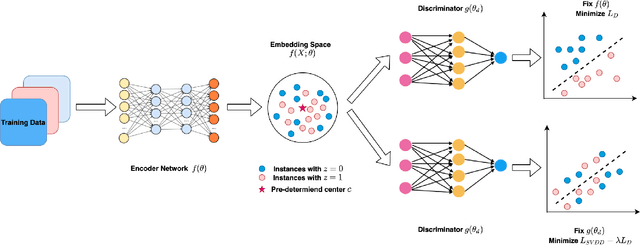Towards Fair Deep Anomaly Detection
Paper and Code
Dec 29, 2020



Anomaly detection aims to find instances that are considered unusual and is a fundamental problem of data science. Recently, deep anomaly detection methods were shown to achieve superior results particularly in complex data such as images. Our work focuses on deep one-class classification for anomaly detection which learns a mapping only from the normal samples. However, the non-linear transformation performed by deep learning can potentially find patterns associated with social bias. The challenge with adding fairness to deep anomaly detection is to ensure both making fair and correct anomaly predictions simultaneously. In this paper, we propose a new architecture for the fair anomaly detection approach (Deep Fair SVDD) and train it using an adversarial network to de-correlate the relationships between the sensitive attributes and the learned representations. This differs from how fairness is typically added namely as a regularizer or a constraint. Further, we propose two effective fairness measures and empirically demonstrate that existing deep anomaly detection methods are unfair. We show that our proposed approach can remove the unfairness largely with minimal loss on the anomaly detection performance. Lastly, we conduct an in-depth analysis to show the strength and limitations of our proposed model, including parameter analysis, feature visualization, and run-time analysis.
 Add to Chrome
Add to Chrome Add to Firefox
Add to Firefox Add to Edge
Add to Edge